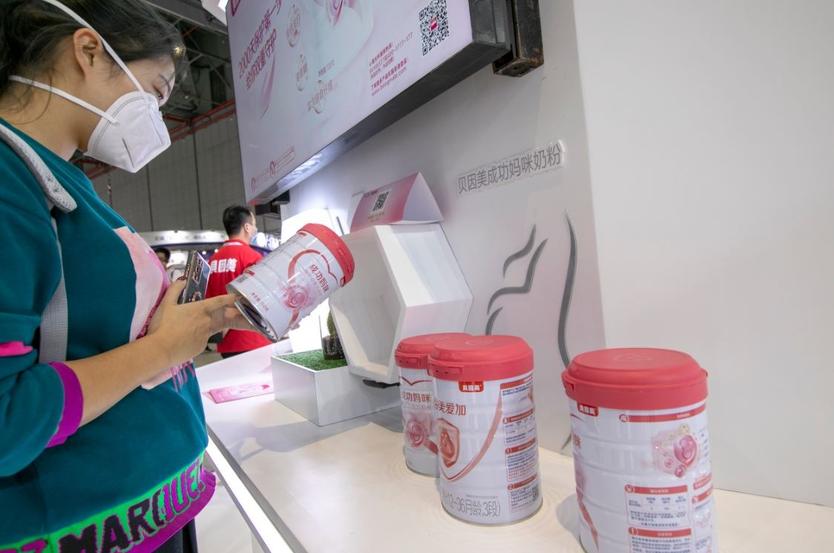 A visitor checks Beingmate products during a maternity and baby products expo in Shanghai in October 2020. (PHOTO PROVIDED TO CHINA DAILY)
A visitor checks Beingmate products during a maternity and baby products expo in Shanghai in October 2020. (PHOTO PROVIDED TO CHINA DAILY)
A day after China announced its new policy to allow married couples to enjoy the third-child policy, certain stocks on the Chinese bourses rose on Tuesday, with shares of companies that produce maternal and infant goods surging the most.
Market mavens said the policy announcement was interpreted by the stock markets as a move to bolster fertility rates. This triggered a rise in shares of a large number of related companies.
Shenzhen, Guangdong province-listed J&F Labi Maternity and Baby Articles, among other A-share related stocks, closed 10 percent higher at its daily limit at 20.16 yuan (US$3.16).
Shenzhen-listed Chinese infant formula producer Beingmate Baby and Child Food Co Ltd also rose by the 10 percent daily limit to close at 6.61 yuan.
If more babies are born, demand for vaccines for babies at birth will likely surge. Besides, as the consumption upgrade trend continues, parents will increasingly pursue high-quality products and pay attention to early-stage training for their offspring.
Chen Mengjie, analyst of Yuekai Securities.
Stocks of both maternity and baby products retailer Babemax and medical devices manufacturer Yihua Healthcare Co Ltd surged 10 percent to close at 30.5 yuan and 6.16 yuan, respectively.
"If more babies are born, demand for vaccines for babies at birth will likely surge. Besides, as the consumption upgrade trend continues, parents will increasingly pursue high-quality products and pay attention to early-stage training for their offspring, so business segments like baby and toddler food, toys and early education are foreseen benefiting from the trend," said Chen Mengjie, an analyst of Yuekai Securities.
ALSO READ: HK stocks rise as mainland's 3-child policy boosts health firms
A key meeting of the Communist Party of China on Monday highlighted the significance of the third-child policy, support measures in improving the demographic structure and maintaining China's edge in human resources.
Some observers said the latest policy may also help accelerate the development of emerging industries and related technologies like assisted reproduction in China.
As of the beginning of 2020, there were more than 500 medical facilities in China that had been approved to carry out human-assisted reproductive technology. Nearly 30 medical institutions had been approved to set up human sperm banks.
Currently, most medical institutions that offer reproductive technologies are located in major cities, and experts said some middle-aged couples who would like to have a third child may pursue assisted reproduction technology to maximize the success rate of getting pregnant.
Meanwhile, the policy is expected to bring medium to long-term benefits for companies in the infant formula sector.
Chinese dairy maker Ausnutria Dairy Corp said infant formula is a product with steady demand, which is foreseen to rise with the anticipated growth in the number of newborns. Ausnutria said the third-child policy will likely provide significant boost to the company's growth, so from now on, it will focus on raising product quality and innovations.
Zhu Danpeng, an independent food industry analyst, said the third-child policy announcement has brought fresh hopes to many sectors. It will have a positive impact on the maternal, infant and children's food sectors in the medium-to-long term.
Song Liang, an independent dairy analyst, said retailers of infant formula will still compete for the existing market demand for a while, instead of competing for the expected incremental demand. Still, the policy will help fuel the growth of the infant formula market in the long term.
"The policy will bring more confidence to the capital market, especially for listed infant formula companies. It will help expand total capacity of the infant formula market. Data showed that about half of newborns last year were second children. The third-child policy would contribute to a small increase in birthrates, which will help the market grow," Song said.
READ MORE: China to support couples having third child
In the short term, the new policy is expected to help increase the number of new births by about 10 percent. The policy is foreseen to help maintain the birthrate at 1.5 percent to 1.8 percent overall. In the mid to long-term, China still needs encouraging birth policy to maintain birthrates in a reasonable range, said a research report by CITIC Securities.


